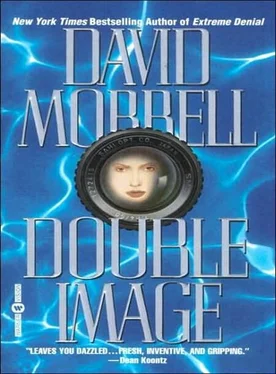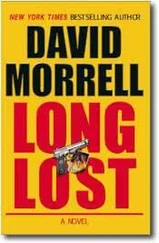Back at his grandparents’ house, he began the long, heart-sinking process of disposing of the accumulation of a lifetime. The telephone rang as he sorted through a shoe box full of receipts.
“How are you feeling?” Jennifer asked.
“About what you’d expect.” Snow lancing against the living room window made Coltrane look in that direction.
“I thought I’d call to try to cheer you up.”
“I’m glad you did.” Coltrane thought he heard Jennifer exhale in what might have been nervous relief.
“A lot of memories to deal with, I bet,” Jennifer said.
Coltrane slumped into his grandfather’s rocking chair. “I lived here until I was eighteen, until I moved out to Los Angeles to go to college. Last night, I slept upstairs in my old bedroom. The furniture’s still the same. In fact, it’s even in the same position. The only spot I haven’t… I keep wanting to go down to where I used to hide in the basement when I was a kid – where I used to think about my mother. But I can’t bring myself to look at where” – he could hardly say it – “Ilkovic killed them.”
“Are you going to sell the house?”
“No. I ran into some seniors who were friends of my grandparents. One old couple had their rent raised, and they can’t afford to live in their apartment anymore. I’m going to let them stay here for free. They said they didn’t want charity, so I told them they’d be doing me a favor – that I needed somebody to take care of the place.”
“Nice.”
“Well” – Coltrane looked at the big Christmas tree in the corner of the living room – “it’s that time of year.”
“Will you be back for the holiday?”
“I don’t think I can manage by then.”
“Oh.” Jennifer’s voice dropped. “I was hoping… I’m still having trouble about… I don’t want to have anything hanging between us. I’m sorry about what I said after Daniel’s funeral.”
“There’s nothing wrong with wanting some time to yourself.”
“But I could have picked a better time to say it. I’m still confused, but…”
“You’re not the only one.”
“Maybe I’m ready to talk about it now.”
“We’ll do that when I get back,” Coltrane said.
“Yes. Not on the phone.”
“Not on the phone. Have a good holiday.”
“Same to you. At least as good as you can. Mitch, I haven’t forgotten about the special edition of the magazine. The photographs are still at Packard’s house. When you come back…”
“I’ll make sure you get them.”
The snow lanced harder against the front window as Coltrane hung up. He walked to the window and watched dusk thicken. Cars struggled through deepening drifts.
His photographs – they had completely slipped from his mind. It was a measure of how severely things had changed. A week ago, he had been elated about the new direction that his life was taking. He had felt reborn. And now he could barely recall the sense of renewal that had made him excited. Out of habit, he had brought a camera with him, but it remained in one of his suitcases, along with shirts that he hadn’t unpacked.
Going into the front hallway, smelling must, he started up the oak staircase. The banister felt wobbly. Or maybe I am, he thought. In his bedroom, he opened his suitcase, took out his camera, set it aside, and removed a large manila envelope that he had reinforced with stiff cardboard to make sure that it didn’t bend.
The envelope contained a dozen photographs from the chamber in Packard’s vault. He spread them out on the bed and stared down at them, directing his gaze from left to right. Dizzily returning to the first, he began again.
And again. The haunting woman looked back at him.
“SHE WAS AN ACTRESS.”
It was four days after Christmas. Coltrane was back in Los Angeles, sitting in the uncluttered office of the private investigator he had hired before going to New Haven.
The man’s name was Roberto Rodriguez. Short and slender, with silver sideburns, wearing spectacles and a conservative suit, he looked more like an attorney than a private detective.
“This is a photocopy of the police file. You can keep it.”
“Police file?” Coltrane worked to steady his right hand as he opened the file. A faint blotched image on a Xerox of a photograph peered up at him, making him tingle. As imprecise as it was, the image left no doubt. That lush dark hair. Those expressive lips and almond-shaped eyes. He was looking at the woman in Packard’s photographs.
He turned the page and frowned at typescript that was hard to read, faded by age and what incomplete portions of characters suggested was an overused typewriter ribbon. “Missing persons department?”
“The complaint was filed by her agent back in 1934,” Rodriguez said. “She had a five-year contract with Universal. Nothing major. She certainly wasn’t a star, although judging from the photo I used to make that Xerox, she could have been. When she didn’t show up for the start of a picture, the studio grumbled to her agent, and the agent realized that he hadn’t heard from her in over three months. Which tells you how close they were.”
“And?”
“There isn’t an ‘and.’ She was never found.”
Coltrane felt a sinking sensation. “But how could Randolph Packard have purchased the house from her if she was never located?”
“Who knows? Maybe after a year she was assumed dead and her parents got permission to put it on the market. Somewhere in that file there’s a summary of a telephone interview with them. The detective in charge of the investigation wanted to know if she had ever shown up where they lived in Texas. They claimed they hadn’t seen her in four years. Which tells you how close the family was.”
Coltrane turned more pages, shaking his head, baffled.
“The detective notes that the family didn’t have a phone. The interview took place at the local police station,” Rodriguez said. “Add the abundance of ain’ts and double negatives, and you get the impression of a down-on-his-luck, undereducated farmer. But his last name isn’t Chance. It’s Chavez. The daughter’s first name isn’t Rebecca. It’s Juanita.”
“She changed her name to disguise her Hispanic origins?”
“I love old movies. I love to read about them,” Rodriguez said. “Back in the twenties and thirties, you get male stars with ethnic names. Rudolph Valentino and Ramon Novarro come to mind. The studios played up their sultry appearance. But I can’t think of more than a few female stars – I’m talking major – who didn’t have a white-bread appearance and name. That doesn’t mean they were white-bread. Several of them had ethnic backgrounds, but they hid it. Had to. Rita Hayworth’s a good example. She didn’t become famous until the forties, but her career started in the thirties. She was Hispanic. Her real name was Margarita Cansino. She had dark hair and a widow’s peak that made her look very Spanish at a time when there was a growing prejudice against Mexicans. So she dyed her hair auburn and plucked out her widow’s peak to make her hairline look symmetrical. She added some voice lessons to get rid of her accent, changed her name, and managed to assimilate herself. It looks to me like Rebecca Chance did the same.”
“HERE.” The reference librarian, a petite young woman in braids, escorted Coltrane into a Spartan room that had several microfilm machines. “When you’re finished, please bring the film back to my desk.”
“Thanks,” Coltrane said.
It had been years since he had used this kind of machine, but his familiarity with it soon came back. After attaching the roll to a spindle on the right at the bottom, he fed the film through the machine and linked it to a spindle on the left. By twisting a knob, he could forward the film past the light that projected and magnified the small print onto the screen. The roll was for all the issues of the L.A. Times that had been published during the last quarter of 1934, which, according to the police report Coltrane had brought with him, was when Rebecca Chance, born Juanita Chavez, had disappeared – specifically, during the second week of October. The missing persons’ report had been filed on October tenth, two days after she failed to show up for work. That meant Coltrane had only nine issues of the newspaper to spin through before he got to the period of time that interested him, but to give himself some context and to avoid missing any seemingly innocent reference to her earlier, he made an effort not to speed ahead but, rather, to take his time and do the job right.
Читать дальше












